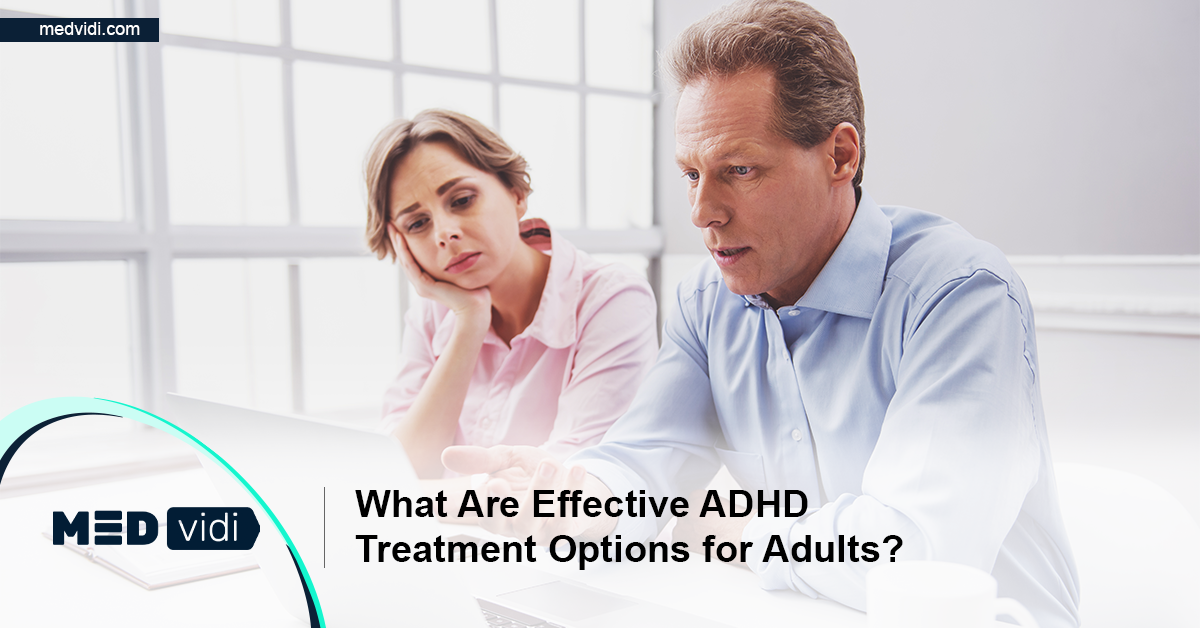Understanding Adult ADHD: Diagnosis And Treatment Options

Table of Contents
Recognizing the Symptoms of Adult ADHD
Adult ADHD presents differently than in children, often manifesting as subtle challenges rather than overt hyperactivity. Accurate self-assessment and professional evaluation are key to diagnosis.
Inattention
Difficulty focusing on tasks, losing things frequently, and being easily distracted are hallmark symptoms of Adult ADHD inattention. Struggling with organization and planning is also common.
- Examples of inattentive symptoms in daily life:
- Missing deadlines at work or school.
- Forgetting appointments or social engagements.
- Struggling to follow conversations or instructions.
- Difficulty completing tasks requiring sustained attention.
- Misplacing keys, wallets, or other important items frequently.
It's important to distinguish these symptoms from typical forgetfulness or disorganization. In Adult ADHD, inattention is persistent, pervasive, and significantly impacts daily functioning.
Hyperactivity
While the hyperactivity associated with childhood ADHD might be less pronounced in adults, it still manifests in ways such as excessive restlessness, fidgeting, and difficulty sitting still, especially in situations requiring prolonged focus. Adults with ADHD may also experience internal restlessness and an inability to relax.
- Examples of hyperactive symptoms in adults:
- Restlessness and an inability to sit still for extended periods.
- Interrupting conversations frequently.
- Difficulty relaxing or engaging in quiet activities.
- Feeling restless even when physically tired.
- A constant need to be doing something, even if it's unproductive.
Adults might find themselves pacing, tapping their feet, or engaging in other subtle movements to release pent-up energy. These behaviors are often unintentional and can be a source of frustration.
Impulsivity
Impulsivity is a core feature of Adult ADHD, characterized by making hasty decisions, acting without thinking, interrupting others, and difficulty waiting one's turn. These impulsive behaviors can have significant consequences.
- Examples of impulsive behaviors in adults:
- Impulsive spending or financial mismanagement.
- Risky behaviors such as reckless driving or substance abuse.
- Difficulty controlling emotions, leading to outbursts or angry reactions.
- Interrupting others in conversations.
- Making quick decisions without considering the potential consequences.
Untreated impulsivity can lead to relationship problems, job loss, and legal difficulties. Learning to manage impulsivity is crucial for improving overall functioning.
The Diagnostic Process for Adult ADHD
A proper diagnosis of Adult ADHD is crucial for accessing appropriate treatment and support. The process involves a comprehensive evaluation by a qualified healthcare professional.
Initial Consultation
The initial consultation with a psychiatrist, psychologist, or other licensed professional is vital. This appointment focuses on gathering a detailed medical history and conducting a thorough symptom assessment.
- What to expect during the initial consultation:
- A detailed discussion of your symptoms and their impact on your life.
- A review of your medical history, including any family history of ADHD.
- A psychological evaluation to assess other potential contributing factors.
The healthcare professional will ask detailed questions about your symptoms, their severity, and their onset. Honesty and open communication are critical during this process.
Diagnostic Tools
Several assessment methods are used to diagnose Adult ADHD. These tools help to differentiate ADHD symptoms from other conditions.
- Various assessment methods:
- Clinical Interviews: Structured interviews designed to elicit specific information about ADHD symptoms.
- Questionnaires: Self-report questionnaires such as the Adult ADHD Self-Report Scale (ASRS) provide valuable information about symptom presentation.
- Neuropsychological Testing: Tests designed to assess cognitive functions like attention, memory, and executive function, can help confirm the diagnosis.
These tools provide a comprehensive picture of your cognitive functioning and symptom presentation.
Ruling Out Other Conditions
It's crucial to rule out other conditions that may present with similar symptoms. This differential diagnosis ensures accurate identification of the underlying problem.
- Conditions that can mimic ADHD symptoms:
- Anxiety disorders.
- Depression.
- Sleep disorders.
- Bipolar disorder.
- Trauma-related disorders.
A comprehensive assessment helps to differentiate ADHD from these other conditions, leading to more effective treatment.
Effective Treatment Options for Adult ADHD
Effective management of Adult ADHD often involves a combination of medication, therapy, and lifestyle changes.
Medication Management
Medication is a common treatment approach for Adult ADHD. Stimulants and non-stimulants are frequently prescribed, each with its own mechanism of action and potential side effects.
- Types of medication:
- Stimulants: Increase dopamine and norepinephrine levels in the brain. Examples include methylphenidate (Ritalin) and amphetamine (Adderall).
- Non-stimulants: Work differently than stimulants and may be suitable for individuals who cannot tolerate stimulants. Examples include atomoxetine (Strattera) and guanfacine (Intuniv).
It's crucial to work closely with a prescribing physician to find the right medication and dosage, monitoring for side effects and adjusting as needed.
Therapy and Counseling
Therapy plays a crucial role in managing Adult ADHD. Cognitive Behavioral Therapy (CBT) and behavioral therapy help develop coping mechanisms for managing symptoms and improving daily functioning.
- Therapeutic approaches:
- CBT: Helps identify and change negative thought patterns and behaviors that contribute to ADHD challenges.
- Behavioral Therapy: Focuses on teaching specific strategies for improving organizational skills, time management, and impulse control.
Therapy addresses the emotional and behavioral challenges associated with ADHD, improving self-esteem and overall well-being.
Lifestyle Changes
Lifestyle modifications significantly impact ADHD symptom management. These changes support brain function and improve overall health.
- Lifestyle changes:
- Regular exercise: Improves focus and reduces impulsivity.
- Healthy diet: Provides the brain with the nutrients needed for optimal function.
- Sufficient sleep: Improves attention and reduces impulsivity.
- Stress management techniques: Help regulate emotions and improve focus.
Implementing these lifestyle changes can complement medication and therapy, enhancing their effectiveness.
Conclusion
Understanding and effectively managing Adult ADHD requires a multi-faceted approach. This article has explored the key symptoms, the diagnostic process, and various treatment options available to help adults successfully navigate the challenges of this condition. From medication management and therapy to lifestyle changes, a comprehensive strategy tailored to individual needs is crucial for improving quality of life. If you suspect you or someone you know may have Adult ADHD, seek professional help for a proper diagnosis and to discuss the best treatment options for your specific situation. Take the first step towards better managing your Adult ADHD today.

Featured Posts
-
 A Look Ahead Ru Pauls Drag Race Season 17 Episode 11 And The Ducks
Apr 30, 2025
A Look Ahead Ru Pauls Drag Race Season 17 Episode 11 And The Ducks
Apr 30, 2025 -
 Mwajht Jnwb Alswdan Wmwrytanya Bakambw Yezz Sfwf Alkwnghw Aldymqratyt Fy Tsfyat Kas Alealm
Apr 30, 2025
Mwajht Jnwb Alswdan Wmwrytanya Bakambw Yezz Sfwf Alkwnghw Aldymqratyt Fy Tsfyat Kas Alealm
Apr 30, 2025 -
 Understanding Black History Dr Jessica Johnsons Perspective On Yates
Apr 30, 2025
Understanding Black History Dr Jessica Johnsons Perspective On Yates
Apr 30, 2025 -
 The Owen Family Balancing Farm Work And Family Life
Apr 30, 2025
The Owen Family Balancing Farm Work And Family Life
Apr 30, 2025 -
 Our Yorkshire Farm Stars Emotional Goodbye Amanda Owen In Tears
Apr 30, 2025
Our Yorkshire Farm Stars Emotional Goodbye Amanda Owen In Tears
Apr 30, 2025
Latest Posts
-
 Channing Tatum And Inka Williams A New Couple Spotted In West Hollywood
Apr 30, 2025
Channing Tatum And Inka Williams A New Couple Spotted In West Hollywood
Apr 30, 2025 -
 Domaine Carneros Sustainable Energy Solutions With Schneider Electric
Apr 30, 2025
Domaine Carneros Sustainable Energy Solutions With Schneider Electric
Apr 30, 2025 -
 Schneider Electric Strong 2024 Revenue And Earnings Growth Driven By Data Center Boom
Apr 30, 2025
Schneider Electric Strong 2024 Revenue And Earnings Growth Driven By Data Center Boom
Apr 30, 2025 -
 Domaine Carneros Achieves Energy Independence With Schneider Electric Microgrid
Apr 30, 2025
Domaine Carneros Achieves Energy Independence With Schneider Electric Microgrid
Apr 30, 2025 -
 Schneider Electrics Strategy For Womens Advancement In Nigerias Energy Sector
Apr 30, 2025
Schneider Electrics Strategy For Womens Advancement In Nigerias Energy Sector
Apr 30, 2025
